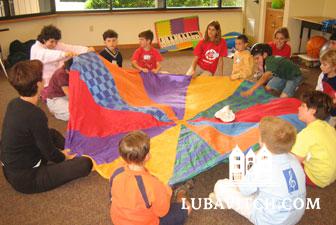Fifty children with various developmental delays and physical challenges and seventy-five teenage volunteer buddies will craft menorahs, played dreidel games and sing together at at a Chanukah party at Chabad of Greater South Bay’s Friendship Circle on Sunday.
The interaction, guided by a school psychologist who specializes in special education, is exactly what the doctor – and the therapists – ordered.
According to experts, this kind of lively Chanukah event will help children with special needs accomplish vital social goals.
“Play provides a medium through which children develop skills, experiment with roles, and interact with others,” according to the National Autistic Society’s website. “Lack of play skills can aggravate children’s social isolation and underline their differences from other children.” Brenda Kagan of San Carlos, CA, set aside other Chanukah plans and will drive her daughter, who is on the autism spectrum, to the party. She knows Audrey, 11, could tolerate about 30 minutes of socializing, but is making the Friendship Circle event a priority.
“She really wants to have friends, but other kids don’t want to play with her,” Kagan told Lubavitch.com. At the party, Audrey’s buddy will be at her side the whole time, to play, to laugh. “It does wonders for her spirit.”
Last year, FC of Palo Alto’s volunteers brought 5,650 hours of friendship to children with special needs. Volunteers and buddies came together for holiday events, Sunday gatherings, and during one on one home visits an hour each week. Chabad’s Friendship Circles can be found in 150 cities around the world, and the number is growing.
Behind the success of the Friendship Circle is careful planning. Before any Friendship Circle event, Rabbi Ezzy and Nechama Schusterman, Chabad Shluchim in Palo Alto team up with Carla Kassof, a school psychologist at Cupertino Union school district. They build an event that gives children with all kinds of needs the opportunity to participate to the fullest extent they can.
To foster social interaction and avoid sensory overload, for instance, activities at the Chanukah party are placed in separate rooms, where small groups could enjoy them without an overwhelming crowd. Because many Friendship Circle participants have trouble processing language, pictures are used to illustrate the schedule of event. Each activity during the program can be tailored to each child’s particular range of abilities and challenges.
In the middle of a recent event, one boy and his buddy scooped up their craft that involved gluing doodads onto a holiday symbol. “The room was too busy for the boy to focus on the project,” said Kassof, “so they finished it outside, where it was quieter.”
For a child with special needs who relies on predictability, to change location and still complete a project offers a snapshot Friendship Circle’s effectiveness. It serves as a safe place to try out social skills. “Spontaneous interaction in a less structured setting gives the children an chance to practice what they are learning in therapy,” said Rhonda Ross, MS, CCC-SLP, who works with children with special needs in Staten Island, NY. “It gives them more an opportunity for them to use their skills and grow.”
But the Schustermans, who work under the direction of Chabad of Greater South Bay’s Rabbi Yosef and Dena Levin, are not looking to make Friendship Circle another therapy session. Many of these children “have at least twenty hours a week of therapy, plus occupational therapy, physical therapy, speech, the list goes on,” said Adina Lasker, an applied behavioral analysis therapist who works with children on the autism spectrum in New York City. “Play is important, each child at his own level. Play is a window into their world.”
According to a study published this fall in Psychology in the Schools, the type of play offered at the Friendship Circle, where volunteers remain with their buddies throughout all activities, is particularly conducive to building social skills. The study found that when compared to a play setting where children “were integrated but not assigned a buddy, peer buddy programs elicited more appropriate play skills.”
At first, Molly Barnes, one of FC of Palo Alto’s 200 teen volunteers was concerned about how to play with a child who cannot communicate verbally. A junior at Henry M. Gunn Sr. High, Barnes’s only prior experience working with the special needs population was giving swimming lessons to a child with a hearing impairment. During training, Barnes learned to use short, simple sentences, facial expressions that matched the emotional content of her words, and deliberate body language to connect with her buddy.
As many social goals can be reached through Friendship Circle programs, Barnes feels she accomplishes the most when she remembers “to treat my buddy like a regular friend.”
“I know these kids do not get many opportunities to be treated like regular people, because of the way they look or because they are developmentally challenged,” she said. “For me, being a friend, making an impact on one person’s life, is one of the most important things.”

Be the first to write a comment.